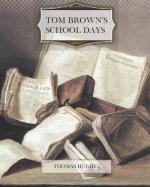“Did he, though?” said Tom; “then Arthur must be wrong.”
“Of course he is,” said Gower—“the little prig. We’ll only use the crib when we can’t construe without it.—Go ahead, East.”
And on this agreement they started—Tom, satisfied with having made his confession, and not sorry to have a locus penitentiae, and not to be deprived altogether of the use of his old and faithful friend.
The boys went on as usual, each taking a sentence in turn, and the crib being handed to the one whose turn it was to construe. Of course Tom couldn’t object to this, as, was it not simply lying there to be appealed to in case the sentence should prove too hard altogether for the construer? But it must be owned that Gower and East did not make very tremendous exertions to conquer their sentences before having recourse to its help. Tom, however, with the most heroic virtue and gallantry, rushed into his sentence, searching in a high-minded manner for nominative and verb, and turning over his dictionary frantically for the first hard word that stopped him. But in the meantime Gower, who was bent on getting to fives, would peep quietly into the crib, and then suggest, “Don’t you think this is the meaning?” “I think you must take it this way, Brown.” And as Tom didn’t see his way to not profiting by these suggestions, the lesson went on about as quickly as usual, and Gower was able to start for the fives court within five minutes of the half-hour.
When Tom and East were left face to face, they looked at one another for a minute, Tom puzzled, and East chokefull of fun, and then burst into a roar of laughter.
“Well, Tom,” said East, recovering himself, “I don t see any objection to the new way. It’s about as good as the old one, I think, besides the advantage it gives one of feeling virtuous, and looking down on one’s neighbours.”
Tom shoved his hand into his back hair. “I ain’t so sure,” said he; “you two fellows carried me off my legs. I don’t think we really tried one sentence fairly. Are you sure you remember what the Doctor said to you?”
“Yes. And I’ll swear I couldn’t make out one of my sentences to-day—no, nor ever could. I really don’t remember,” said East, speaking slowly and impressively, “to have come across one Latin or Greek sentence this half that I could go and construe by the light of nature. Whereby I am sure Providence intended cribs to be used.”
“The thing to find out,” said Tom meditatively, “is how long one ought to grind at a sentence without looking at the crib. Now I think if one fairly looks out all the words one don’t know, and then can’t hit it, that’s enough.”
“To be sure, Tommy,” said East demurely, but with a merry twinkle in his eye. “Your new doctrine too, old fellow,” added he, “when one comes to think of it, is a cutting at the root of all school morality. You’ll take away mutual help, brotherly love, or, in the vulgar tongue, giving construes, which I hold to be one of our highest virtues. For how can you distinguish between getting a construe from another boy and using a crib? Hang it, Tom, if you’re going to deprive all our school-fellows of the chance of exercising Christian benevolence and being good Samaritans, I shall cut the concern.”




